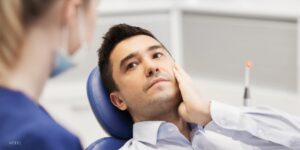
Teeth grinding is a fairly common condition that can have various unpleasant symptoms, some of which may surprise you. Those symptoms can include worn down or broken teeth, loose teeth, increased tooth sensitivity, headaches, earaches, poor sleep, and more.
If you are aware that you have an issue with teeth grinding and are concerned about how it affects your daily life, the best way to address it is to first try to determine the root cause.
There are several common instigators when it comes to this condition, some internal and some external, and pinpointing the one causing it is the first step toward determining a solution.
What Is Teeth Grinding?
Teeth grinding, or bruxism, is a condition in which the patient unconsciously clenches, gnashes, or grinds their teeth while awake or during sleep.
Bruxism can lead to a variety of other issues that can affect the quality of life and potentially require treatment in order to address. For example, excessive teeth grinding can cause damage to teeth that can only be fixed with a dental restoration of some kind.
How Do I Know If I Grind My Teeth?
If your bruxism manifests during the daytime, it is fairly easy for you to observe, although it is an unconscious behavior, so you may not notice it until you look for it specifically.
However, if the issue is occurring at night, you may have no way of telling that the symptoms you are experiencing are the result of bruxism. If you have a partner, they may be able to observe it for you, but if not, then look out for the following symptoms:
- Cracked or chipped teeth
- Worn down teeth
- Loose teeth
- Toothaches or sensitive teeth
- Tightness and soreness in the jaw
- Headaches and earaches
- TMJ pain
- Clicking jaw
All of these symptoms can be the result of various other issues, but regardless of their source, if you are experiencing any of them consistently, speak with your doctor or dentist about the possibility of bruxism, and they will help you move toward a diagnosis and potential solution.
What Causes Teeth Grinding?
There are various reasons why you may be suffering from bruxism. We have listed four of the most common below, along with some potential solutions for each.
1. Stress and Anxiety
This is perhaps the most common cause of bruxism in adults. Stress and anxiety create tension in the body, and there are times when that tension unconsciously manifests as clenching of the jaw and grinding of the teeth.
The connection between the two is not totally understood, but teeth grinding appears to be one of the ways that the body seeks to release stress-related tension, particularly during sleep.
In order to combat this issue, you can try to relieve the stress and anxiety you are dealing with in other ways. Regular exercise is a good outlet for relieving stress, as is meditation, but you can also look at the source of the stress and see if there is any way you can modify it so that it is not having such a profound effect on your body.
2. Bite Misalignment
When your teeth are out of alignment, it can put an uneven amount of pressure on certain points of your mouth and jaw. This can lead to a TMJ disorder, which may cause bruxism in certain instances.
The TMJ, or temporomandibular joint, is the connector between your skull and your jawbone. It is fairly common to develop issues with this joint, and those issues can result in spasms believed to cause teeth grinding and clenching.
Addressing your misaligned bite with orthodontic treatment has a strong chance of providing you with a solution to your bruxism. If TMJ issues persist after orthodontic treatment, there are a few potential pathways to addressing them as well. Your dentist may suggest a night guard in this instance.
3. Certain Medications
Sometimes, it is not an anatomical or psychological issue that is causing your teeth to grind. It may actually be coming from an external source, such as medications you may be taking.
Certain selective serotonin reuptake inhibitors (SSRIs), for example, may cause teeth grinding. Those SSRIs include Paxil, ZOLOFT®, Celexa, EFFEXOR®, and Prozac®.
If you are on one of these medications and suffer from bruxism, you can speak with your doctor about potentially switching your prescription to something that does not have this side effect.
4. Certain Substances
There are various substances people tend to use habitually that can lead to teeth grinding, including cigarettes, alcohol, and caffeine. While it is far from the only issue to consider when deciding whether you should use any of these substances, bruxism is still another good reason to moderate your consumption.
If you are experiencing nighttime bruxism symptoms and consuming an above-average amount of any of these substances, your best bet is to stop them entirely or at least reduce your intake and see if that helps.
Potential Solutions for Bruxism
Addressing your teeth grinding issue is best done with the help of a dental professional or doctor, but if you are wondering what they might tell you at your upcoming appointment, you can probably expect some of the following suggestions:
- Form healthier sleep habits
- Use a bruxism mouthguard at night
- Reduce intake of stimulating substances
- Change medications
- Reduce stress where you can
- Use BOTOX®
- Use biofeedback
Biofeedback is a form of therapy that can help you to notice when you are clenching your jaw so you can make a conscious effort to stop doing it. Therapists use this treatment for day and nighttime bruxism.
Looking for a Solution to Your Teeth Grinding Issue?
Finding the right solution for your bruxism is probably not something you can do on your own, so it is important to speak with a professional to determine the root cause.
The team at Los Angeles Center for Oral & Maxillofacial Surgery can help diagnose your teeth grinding issue and provide you with a potential solution. Take a look at our other articles for more information.



